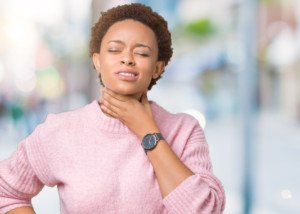
Is your voice hoarse when you wake up in the morning?
Why doesn’t drinking fluids get rid of the morning hoarseness?
Don’t believe what you see on TV: People speaking in a crisp, clear voice the moment they awaken.
Few people, if any, have this gift. Awakening with a hoarse voice is human nature and everyone’s voice sound crummy first thing in the morning.
There are several causes of a hoarse voice upon awakening from an extended sleep.
These include a very long “nap” or a sleep cycle that takes place during daylight for nightshift workers.
I asked two ear, nose and throat (ENT) doctors about this annoying phenomenon.
But first of all, we all know that the more you talk immediately after awakening, the quicker the hoarseness in your voice dissipates.
And if you don’t talk at all, the hoarseness will still eventually disappear — if your first words come a few hours later, the hoarseness will almost always be absent.
My question to both physicians applied to healthy people who do not have infections, colds, vocal cord nodules, reflux, other illness, and who are not heavy smokers or have some other medical condition that causes a hoarse voice.
Steven Y. Park, MD, explains that the hoarse morning voice is caused by stomach juices bathing the throat.
“The simplest way to prevent this or lessen the severity is to eat dinner early (go to bed no earlier than 3-4 hours after eating.),” says Dr. Park, author of the book, “Sleep, Interrupted: A Physician Reveals The #1 Reason Why So Many Of Us Are Sick And Tired.”
Dr. Park continues: “Residual stomach juices can leak up into the throat while sleeping.
“Also, the same applies to alcohol, since alcohol relaxes your muscles, and your juices can come up more easily.
“It also relaxes your tongue muscles, which can cause you to stop breathing and wake up, which not only causes poor sleep, but also forcefully suctions your stomach juices up into your throat.
“All humans are susceptible to this phenomenon to various degrees.”
And that’s not all when it comes to voice hoarseness.
“Morning hoarseness may be caused by mucus accumulation on the vocal cords, and drying of the mucosa (lining) of the vocal cords,” explains Mark Persky, MD, Professor and Chairman, Department of Otolaryngology-Head and Neck Surgery, Beth Israel Medical Center.
What’s ironic is that, before I even questioned the doctors, I had speculated that the chief cause of a morning hoarse voice was “mucus coating the vocal cords.” My mother is right: I should have been a doctor!
Dr. Persky adds that the situation “may be made worse by snoring and during dry weather conditions.”
Now, why doesn’t drinking fluids help ease the hoarse voice?
Many people may think this is an obvious solution, but it won’t have immediate effects “because the swallowing anatomy is separate from the airway where the vocal cords are located,” says Dr. Persky.
However, he continues, “Eventually, fluids absorbed by the body will help hoarseness if it is secondary to drying of the mucosa, although the response will be delayed.”
Can awakening with a hoarse voice be outright prevented?
No. But it can be minimized by using a humidifier in the room to help prevent vocal cords from drying.
Dr. Persky, like Dr. Park, agrees that alcohol should be avoided in the several hours preceding sleep, but also because alcohol is a diuretic and causes the body to lose fluids, which will promote drying.
Dr. Persky says this rule also applies to caffeine.
So upon awakening, what can a person do to get rid of the hoarse voice?
Dr. Persky explains, “Gently clearing the throat of any mucus accumulation will help and well as taking fluids, which will eventually ease vocal dryness.”
The reason fluid intake is still a good idea is that the liquids will get absorbed throughout the body, and this will moisten up the dried vocal cords.
But an immediate response from fluid intake will not happen: Remember, the airway for swallowing fluids does not include the vocal cords.
Finally, “Gargling with a mild saltwater solution will also sooth the throat and help to clear mucus.”

 Dr. Park
Dr. Park Dr. Persky’s
Dr. Persky’s







































